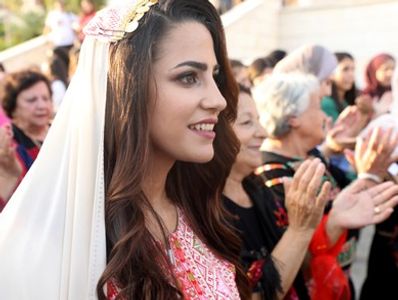CELEBRATIONS/RIGHTS OF PASSAGE
Weddings
Jaha
A cherished Palestinian tradition is the jaha (جاهة) showcasing the tribal roots and customs in Palestinian culture, where a group of male family figures and elders visit the bride’s family to formally ask for her hand in marriage. The jaha signifies respect and creation of new family bonds of bringing the two families together. Many Palestinians choose to continue this tradition in the diaspora as it is an important and cherished tradition even when many couples these days tend to know each other before the wedding.
Zaffa
If there is something to look forward to in a Palestinian wedding, it is the zaffa, a very lively procession celebrating the arrival of the bride and groom and leading them to the wedding venue. It is marked by joy, cheers, singing, drumming and general exuberance for the event. To preserve this important cultural part of Palestinian weddings, most Palestinian weddings outside in the diaspora make big efforts to hire zaffa groups that perform during the zaffa and also sometimes in the middle of the wedding again.
Dabka
Dabka is a traditional dance that is part of the Levant area and is of important significance of Palestinian culture within and outside of Palestine in the diaspora.
Dabka comes from a word meaning stamping one’s feet, and is a group dance where everyone stands together closely and moves with synchronized steps, usually led by someone who is the strongest or most confident dancer, who tends to do more elaborate jumps and adds flair to the dance.
Dabka is a huge part of Palestinian weddings, but it is also taken up by many Palestinians in the diaspora as a way to preserve and hold on to their heritage. It signifies the joy and unity of Palestinians and gives many a sense of belonging.
Candle Dance
An interesting tradition that was done in many Palestinian weddings is the candle dance, where the bride, while accompanied with other women and girls, holds two long candles in her hands, symbolizing the light the bride brings to her new home.
Zaghareet
In Palestinian weddings, you often hear high pitched ululations made by PAlestinian women expressing happiness during a wedding celebration. These sounds called zaghareet (زغاريت) are made several times during a wedding for example, such as when the bride arrives and during the zaffa.
You can sometimes hear a distinct type of zaghareet that combines the ululations with words, starting with “aweeha” and followed by phrases in honor of the bride and groom, and ending with the zaghareet.
I often had family members talk about these fondly, and my mother recalls her grandmother and her sisters, and other elders of the family participating by calling for honors like this.

-Engagements

-Eid

Copyright © 2026 Diaspora Palestine - All Rights Reserved.
This website uses cookies.
We use cookies to analyze website traffic and optimize your website experience. By accepting our use of cookies, your data will be aggregated with all other user data.